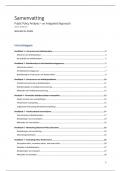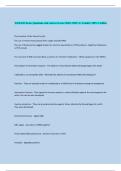DEVELOPMENT
Academiejaar 2019-2020
,LECTURE 1
Rapa Nui
Two thousand three hundred miles to the west of Chile and 1 300 miles to the east of Polynesia’s
Pitcairn Islands lies an island that has inspired intense interest for centuries, not for its perfect
climate or its untouched beauty, but because it holds a secret, a mystery. Rapa Nui, or Easter Island
as it was named by 18th century Dutch explorers, attracts scientists from around the world who
come to study its stone statues, called Moai Statues
→ The creation these statuaries speaks to the existence of a populous, creative and complex
society – one that was well-off enough to support an artisan class
→ They could afford to allocate time and resources to the various activities involved in
making, transporting and erecting hundreds of statues.
= SIGNS OF A POWERFUL PAST
European explorers who visited the island in the 18th and 19th centuries found a population of only
a few thousand, a mere remnant of the statue-building society that came before. Something had
significantly altered life on Rapa Nui.
What had at one time been a sub-tropical forest was now a completely deforested island:
• Overhunting
o Resulting in most wild sources of food gone missing
• Deforestation
o No wood to make canoes → large fish were inaccessible, leaving only fish that could
be caught close to shore
Easter Islanders made use of their surroundings for their physical and cultural needs in the same way
that all human societies do – but they either did not see or did not heed the requirement of keeping
their “systems” in balance, of ensuring that new trees were growing when old trees were cut
This ‘ecocide’ made the Rapa Nui a collapsed society, almost near extinction
Collapse
In the book Collapse (2005), Jared Diamond (Geography Professor at UCLA) suggests a scenario in
which the population continued to exploit resources available to them beyond their limits, in an
environment whose ecological fragility made it vulnerable to permanent destruction.
“How societies choose to fail or succeed”
Research:
• Comparative Method (compare)
• Input & Output variables
• Regression Model (statistical analysis)
Diamond looks into a number of past and present societies to come up with a unified theory about
why societies fail or succeed.
1
Sustainable Development 2019-2020
,There are 5 factors that contribute to collapse:
1. Climate change
2. Hostile neighbours
3. Collapse of essential trading partners
4. Environmental problems
5. Failure to adapt to environmental issues
→ most important underlying reason: overpopulation relative to the practicable carrying capacity
(we would need 3 earths to satisfy the current demand)
“It would be absurd to claim that environmental damage must be a major factor in all collapses ...
It's obviously true that military or economic factors alone may suffice”
Keeping systems in balance
Keeping systems in balance is an important idea that reaches beyond environmental concerns. The
relationship between humans and their natural environment is one to give and take. Today, to safe
the existence of our planet, we need to make rules for sustainable use of the environment.
Think of:
• The demographic balances in a given society,
• The interplay between births, deaths, emigration and immigration
How are we doing?
To look at the statistics, the world today is, on average, a prosperous place:
• Growth in the 2nd half of the 20th century was greater than at any previous historical period
• Average incomes have increased eightfold since 1820
• The population is five times higher.
“The world economy performed better in the last half century than at any time in the past. World
GDP increased six-fold from 1950 to 1998 with an average growth of 3.9 per cent a year compared
with 1.6 from 1820 to 1950, and 0.3 per cent from 1500 to 1820.”
So, how are we really doing?
• Global life expectancy at birth in 1800 was about 30 years, compared with 67 in 2000 and 75
in the rich countries
• The so-called information age has put virtually limitless amounts of data at our fingertips –
provided that we have access to the technology that links us to it
o creating the possibilities for a society that is better informed and more aware than in
any previous historical epoch
• Social revolutions (= sudden changes in the structure and nature of society)
• our choices have multiplied in nearly every domain:
o Educational
o Professional
o Personal
• The globalisation of business, science and culture has also opened up our professional
choices: following a job far from one’s home town, working as an expatriate in another
country, travelling regularly to offices around the world
2
Sustainable Development 2019-2020
, Clouds on the horizon
“If everyone used energy and resources the same way we do in the Western World, we would need
three more earths at least. And we have only one.”
Notably, there is a stark inequality between those with access to the fruits of advanced
development, and those living in contexts where that advancement is impeded by lack of access to
what others take for granted.
• we see this both on national and a global scale
• Not only economic inequalities, also:
o Water and sanitation
▪ water-related illnesses are the second biggest killer of children in the world
o Energy
o Health care
o Education
o …
Developing countries versus developed countries:
• Developing countries
o Lack of elements to fulfil basic needs
o No access to a life of health and quality
▪ Large preventable diseases and epidemics
▪ Violent conflicts
• Developed countries
o Suffer from having too much
The human population continues to grow:
• 8 billion people by 2050 (now 6.5 billion)
• Increased impact on the environment
• More living in the city
Economic development has allowed for advances that have fundamentally changed the ways
humans live from previous centuries, but these activities have also brought about problems with
potentially dramatic consequences:
• Climate change
o Most visible and most hot topic
o Almost certainly undergoing significant change as a result of human activity
o Pushing our ecosystems out of balance
o symbolic of the larger problem
• Social challenges
o Countries are advancing at different speeds
o People within countries are living with vastly different quality of life
▪ The gap between the rich and the poor is increasing rather than thinking
with economic growth
• Ethical aspect
o Take care of the earth and the earth will take care of you
o Thinking about future generations
→ It is important to keep systems in balance (chop a tree, plant two trees instead)
3
Sustainable Development 2019-2020




